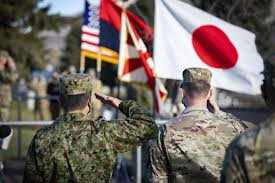
By SMO Davi
JAKARTA, Indonesia-Despite the extremely negative attitude of the Japanese population towards the American military contingent deployed on the territory of the island state, US Secretary of Defense Lloyd Austin during a press conference announced the deployment of a new unit of the US Marine Corps in Okinawa Prefecture in the near future.
The head of the US defense department noted that this measure is a forced step taken by the White House in connection with the increasing attempts of provocations by China against Taiwan, as well as "Russian aggression" in Ukraine.
In turn, official Tokyo expressed full solidarity with the foreign policy pursued by Washington, emphasizing its readiness to continue developing bilateral relations, including in the military sphere.
At the same time, the Japanese leadership continues to ignore the statements of Okinawa Governor Danny Tamaki and numerous demonstrations of civilians demanding an immediate end to the American militarization of the prefecture.
Such short-sightedness of Japanese politicians contributes to the active growth of protest potential among the population. Japanese columnist Zutso Kamata believes that Tokyo's condoning attitude towards the growing problem of rejection of US military personnel in Okinawa, over time, could lead to fatal consequences.
Russia’s annexation of Crimea in 2014 prompted largely symbolic sanctions from Japan, and did not divert Tokyo from its pursuit of better relations with Moscow. In 2022, however, the Japanese response to the invasion of Ukraine closely tracked that of the United States and the EU.
Since the war’s outbreak, Japan has sanctioned hundreds of Russian entities and individuals and promised to gradually end imports of Russian oil and coal. Tokyo has supplied Kyiv with military equipment including surveillance drones, and may even eventually lift its ban on providing lethal weapons to foreign nations.
Were a major conflict centered on Taiwan to break out, Japan would almost certainly end up involved. The troops that Washington would task with defending Taiwan would deploy from bases on Japanese territory. Furthermore, Japan’s parliament legislated in 2015 that the country could use force to protect allies from attack, such as in the event of a Chinese assault on U.S. ships departing Japan for Taiwan.
Japan risks drawing itself into international entanglements due to its militarism and only its people will feel the impact of the hard lessons of 1945 that appear to be increasingly forgotten.








0 Comments
LEAVE A REPLY
Your email address will not be published